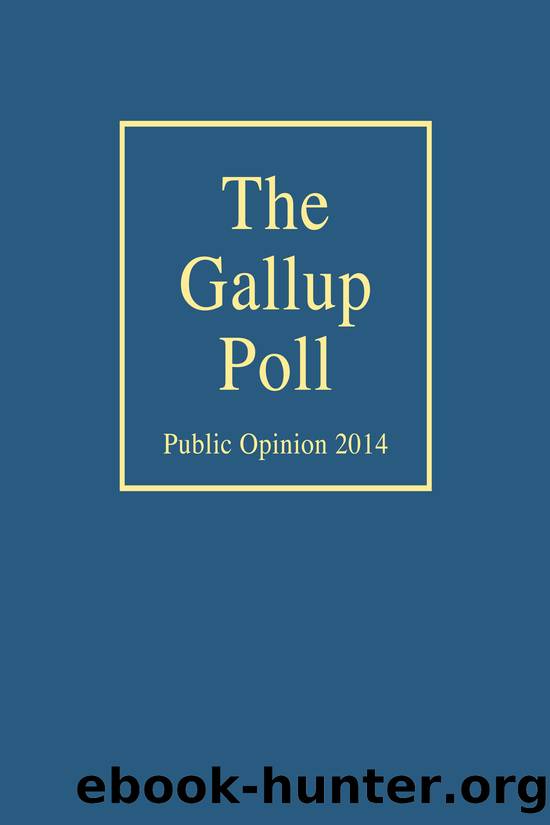The Gallup Poll by Newport Frank;

Author:Newport, Frank;
Language: eng
Format: epub
Publisher: Rowman & Littlefield Publishers
July 09, 2014
Obesity Linked to Lower Social Well-Being
Americans with high social well-being exercise more frequently
by Rebecca Riffkin
WASHINGTON, D.C.âObese and underweight adults in the U.S. are somewhat less likely to be âthrivingâ socially and are more likely to be âsufferingâ than those who are normal weight or are overweight, but not obese.
In fact, those who are obese are the least likely across all weight groups to be thriving socially and underweight individuals are the most likely to be suffering, underscoring the risk of being at either extreme of the weight spectrum when it comes to social well-being.
These data, collected Jan. 1âJune 23, 2014, as part of the Gallup-Healthways Well-Being Index, are based on more than 80,000 interviews, with U.S. adults, aged 18 and older. The social well-being scores are based on respondentsâ answers to items about the strength of their relationship with their spouse, partner, or closest friend; positive energy gained from family and friends; making time for trips or vacations with family and friends; and having someone who encourages them to be healthy. Gallup then categorizes respondents as âthrivingâ (well-being that is strong and consistent), âstrugglingâ (well-being that is moderate or inconsistent), or âsufferingâ (well-being that is low and inconsistent) in their social well-being.
Overall, 41% of Americans are thriving, with 43% struggling and 16% suffering in their social well-being. Gallup previously found that more Americans are thriving in social well-being than in the other four elements measured as part of the Gallup-Healthways Well-Being Index.
Body Mass Index (BMI) scores are based on respondentsâ self-reported height and weight. A BMI of 30 or greater is considered obese, 25.0 to 29.9 is overweight, 18.5 to 24.9 is normal weight, and less than 18.5 is underweight. The majority of Americans are either overweight (35.3%) or obese (27.7%), and just over a third of Americans (34.9%) are a normal weight. The current obesity rate is significantly higher than the 25.5% found in 2008, when Gallup and Healthways began tracking it. A small percentage of the population today, 2.1% vs 1.8% in 2008, is underweight.
Although these data reveal a clear link between extreme weight and lower social well-being, the direction of the relationship is unclear. It is possible that those who are obese or underweight are less likely to have strong social relationships. These Americans may lack self-confidence or be negatively stereotyped based on their weight, making it harder to form or maintain relationships. It is also possible, however, that Americans who are struggling in their relationships with their friends or family are more likely to either eat too much or too little, making it difficult to maintain a healthy weight. Those who lack social support may also have a harder time correcting their eating habits if they veer off course.
High Social Well-Being Linked to Frequent Exercise and Produce Consumption
One possible explanation for the link between weight and lower social well-being is that Americans who have higher social well-being are more likely to eat produce regularly and exercise frequently. Americans who are thriving in their social
Download
This site does not store any files on its server. We only index and link to content provided by other sites. Please contact the content providers to delete copyright contents if any and email us, we'll remove relevant links or contents immediately.
The Secret History by Donna Tartt(18232)
The Social Justice Warrior Handbook by Lisa De Pasquale(11963)
Thirteen Reasons Why by Jay Asher(8472)
This Is How You Lose Her by Junot Diaz(6463)
Weapons of Math Destruction by Cathy O'Neil(5854)
Zero to One by Peter Thiel(5508)
Beartown by Fredrik Backman(5372)
The Myth of the Strong Leader by Archie Brown(5250)
The Fire Next Time by James Baldwin(5033)
How Democracies Die by Steven Levitsky & Daniel Ziblatt(4972)
Promise Me, Dad by Joe Biden(4916)
Stone's Rules by Roger Stone(4875)
100 Deadly Skills by Clint Emerson(4700)
A Higher Loyalty: Truth, Lies, and Leadership by James Comey(4567)
Rise and Kill First by Ronen Bergman(4554)
Secrecy World by Jake Bernstein(4407)
The David Icke Guide to the Global Conspiracy (and how to end it) by David Icke(4397)
The Farm by Tom Rob Smith(4332)
The Doomsday Machine by Daniel Ellsberg(4254)
